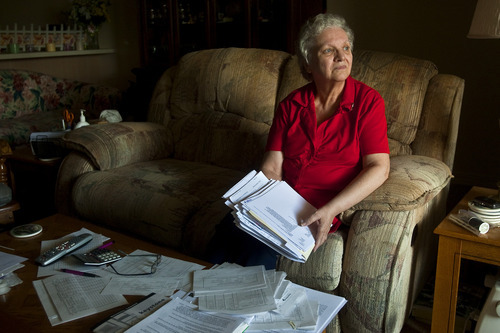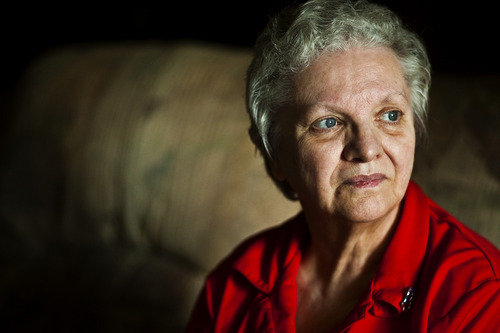This is an archived article that was published on sltrib.com in 2011, and information in the article may be outdated. It is provided only for personal research purposes and may not be reprinted.
Patricia Bailey and Rory Levorsen are two of up to 20,000 Utahns who could face even tougher times because of the Legislature's decision not to pursue federal funding for an additional 13 weeks of unemployment insurance coverage.
Both are within a month of exhausting their eligibility for jobless benefits, and they are bristling at state Senate President Michael Waddoups' comments that bypassing federal aid could provide "motivation for people to get back to work."
"Maybe you should walk in my shoes before you insinuate I am lazy and do not deserve" unemployment insurance, wrote Bailey, 63, a Midvale bookkeeper, to Waddoups in an email shared with The Salt Lake Tribune.
"Shame on you," she added. "My [unemployment check] is only $176 a week — big bucks to try to live on. My Social Security is only $857 a month, and I have to, and I want to, work. I have no family to turn to for help. I feel I paid my dues and will continue to pay my dues if someone will give me a chance to work."
Levorsen, an out-of-work, 48-year-old journeyman sheet-metal worker who lives in Sugar House, expressed similar sentiments to The Tribune.
"I'm very upset at those legislators," he said. "They should be collecting unemployment. They should have that opportunity to be laid off for a year and three months and have to scramble for the money to support their families."
Under provisions of the 2009 stimulus package, the state could have received$60 million to $100 million in federal funding to underwrite an additional 13 weeks of jobless benefits — in addition to the 73 weeks of coverage now provided (26 weeks of state assistance, plus 47 weeks of extended federal benefits).
But to qualify, the Legislature had to change state law regarding eligibility provisions. Lawmakers didn't address that issue during their session, concerned largely about potential impacts on companies that pay premiums into the state's unemployment trust fund.
Although that fund took a beating during the downturn, dropping from $846 million in 2008 to $290 million earlier this year, it is more stable than most of the country's state unemployment funds.
Even the advisory council that oversees the fund was concerned that statutory changes tied to the federal money — and the possibility of higher employer premiums — would endanger Utah's sluggish economic recovery, causing more overall harm than the pain inflicted on a few thousand individuals.
So it made no recommendations to change the statute, and the legislative session ended without consideration of the matter.
Waddoups didn't respond to a call seeking comment Wednesday.
Gov. Gary Herbert's office defended the approach in a response to Bailey's letter.
"The real challenge for state government is balancing the needs of Utah's unemployed with the cost to fund unemployment insurance, which is shouldered by Utah businesses in the form of payroll taxes.
"As Utah's economy is becoming stronger and we see that new unemployment filings are starting to decrease," the response said, "we don't want to inhibit business from retaining or growing jobs."
Added Rep. Gage Froerer, R-Huntsville, in a separate letter to Bailey: "The majority of us do have 'you' in mind when we don't raise taxes and balance the state's budget… and do our very best to pass laws which encourage business to thrive."
Bailey's not buying their arguments.
She maintains that unemployment benefits come from an insurance plan funded by her former employers that displaced workers should be able to tap into when needed.
"That's not state taxes. It's a separate fund. They're denying me my federal portion," Bailey said.
She hopes other impacted people rally together to show lawmakers that "we're not welfare people. There's a lot of us out there who are qualified for jobs but can't get them. It's hard to break into what I know best because I'm 63 and there's so many young kids coming out of college."
Levorsen also said his inability to find work isn't because of a lack of effort.
Utah's construction industry is still hurting badly, he said, "and there are not a lot of jobs where a person in the construction field could go out and find employment because most [openings] are for clerical or medical jobs. A construction worker doesn't have the skills to go in and do that type of work."
Without the safety net provided by unemployment benefits, neither Bailey or Levorsen have confidence in their ability to stay off food stamps or other public assistance until they find work.
For Bailey, that prospect is unacceptable.
"I have to work. My Social Security will not sustain me," she said. "I will have to work until the day I die."





